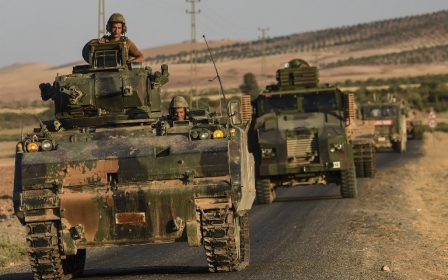Turkey’s Syrian disaster

It’s been over six months since Turkey launched its foray into Syria, Operation Euphrates Shield. Examining the developments, one cannot help but conclude that from a political, tactical and operational perspective, Ankara’s intervention has been quite the failure.
Turkey’s eyes are larger than its stomach, but so far its battleground effectiveness has been lacklustre at best. Meanwhile, diplomatically, it has been outmanoeuvred
From the outset, there was confusion about the operation’s aims and objectives. First, it was to maintain Turkey’s border security by confronting the so-called Islamic State (IS). It also sought to prevent the Kurdish Democratic Union Party (PYD) and its associated fighting forces the People’s Protection Units (PYG) - which Ankara claims is the Syrian branch of the Kurdistan Workers Party (PKK) - from setting up a corridor in northern Syria. (The YPG is the dominant force in the US-backed Syrian Democratic Forces (SDF), which is fighting IS in northern Syria.)
However, after just a couple of weeks of fighting, Turkish President Recep Tayyip Erdogan declared that Turkey’s aims were actually to overthrow Syrian President Bashar al-Assad. This, of course, raised an eyebrow for the Syrian dictator’s international bestie, Russian President Vladimir Putin. Soon Ankara was obliged to back-pedal and clarify that the operation was against “only terror organisations”.
But Ankara continues to change the goalposts. Fresh after its long drawn-out battle for the city of al-Bab, Turkey is currently spoiling for a fight against IS's main base in Raqqa, while also setting its sights on the Kurdish-held city of Manbij with clashes already reported.
Clearly, Turkey’s eyes are larger than its stomach, but so far its battleground effectiveness has been lacklustre at best. Meanwhile, diplomatically, it has been outmanoeuvred.
Slow and costly advance
Back in August and September 2016, Turkish forces in Syria were doing OK. Together with its Syrian brigades, Turkish forces captured the border town of Jarabulus from IS and were soon taking surrounding villages held by both IS and the SDF. It went downhill from there.
It took Turkey 16 weeks to fully capture a city with a population with a mere 65,000
Following its approach to the western part of the strategic city of al-Bab, Turkish-backed forces were either repelled or held back by IS's fierce resistance or the SDF who were also trying to drive IS out.
When Ankara was finally able to penetrate the city from the north, it received no support from the US or other coalition forces. It took Turkey 16 weeks to fully capture a city with a population with a mere 65,000.
In one incident alone in December 2016, IS killed 16 Turkish soldiers in al-Bab. Meanwhile, also in December, the terror group released a video that purported to show two Turkish soldiers being burned to death while in chains. Unwilling to confirm the veracity of the reports (although admitting that two soldiers had gone missing), Turkish authorities simply issued a news blackout and a temporary ban on social media instead.
Scores of Turkish soldiers, hundreds of FSA rebels and hundreds of civilians have been killed during Operation Euphrates Shield
There have also been scores of civilian deaths. In early January, the Syrian Observatory for Human Rights (SOHR) estimated that 292 civilians had been killed by Turkish fire since the start of the operation and hundreds more when factoring civilian deaths at the hands of Turkey’s Syrian clients.
Dividing anti-IS forces
From the position of the anti-IS coalition, Turkey’s advances have brought little gain seeing that many of the towns and villages captured were already in the hands of Kurdish anti-Islamic State forces. If anything, by fighting the PYD, Turkey has contributed to divisions within the coalition, pushing the battle effective Syrian Kurds towards Russia.
While Turkey might wish to sideline the group because of its alleged links to the PKK, the fact remains that the PYD is a Syrian actor which will have an interest in the future of Syria
Indeed, while Turkey looks to launch an operation to take Manbij, the PYD managed to outsmart Ankara by threatening to simply hand over the city to Assad, preventing Turkey from making a large-scale incursion else face the wrath of Putin.
What is more, the PYD represents a domestic Syrian fighting force with a stake in the country’s future. While Turkey might wish to sideline the group because of its alleged links to the PKK, the fact remains that the PYD is a Syrian actor which will have an interest in the future of Syria especially once the guns fall silent.
Quite frankly, apart for a very small buffer in the north of Syria, Turkey’s intervention has not seen any real tangible results. The PYD is still strong and the international community is loath to see Ankara involved in the forthcoming Raqqa operation against the Islamic State.
If anything, Turkey’s is now in a more vulnerable position diplomatically and is viewed with increasing suspicion by its traditional allies. Turkey chose to become an actor in the worst civil war the Middle East has ever seen, and the decision was a bad one.
- Simon A Waldman is visiting fellow at King’s College London and the co-author of the recently published, “The New Turkey and Its Discontents.” He tweets @simonwaldman1
The views expressed in this article belong to the author and do not necessarily reflect the editorial policy of Middle East Eye.
Photo: People drive through a damaged neighbourhood in the northern Syrian town of al-Bab, Syria on 8 March 2017 (Reuters)
Stay informed with MEE's newsletters
Sign up to get the latest alerts, insights and analysis, starting with Turkey Unpacked
Middle East Eye delivers independent and unrivalled coverage and analysis of the Middle East, North Africa and beyond. To learn more about republishing this content and the associated fees, please fill out this form. More about MEE can be found here.







